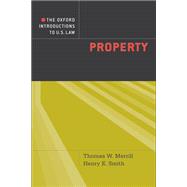
The Oxford Introductions to U.S. Law
by Thomas W. Merrill; Henry E. SmithRent Textbook
Rent Digital
New Textbook
We're Sorry
Sold Out
Used Textbook
We're Sorry
Sold Out
Summary
Author Biography
Thomas W. Merrill is a professor of law at Columbia Law School, where he teaches in the areas of property, environmental law, natural resources, administrative law, and legislation. After graduating from Grinnell College and Oxford University, he received his J.D. from the University of Chicago, and then clerked for the Hon. David Bazelon, U.S. Court of Appeals for the D.C. Circuit, and the Hon. Harry Blackmun, U.S. Supreme Court. From 1987-1990 he served as Deputy Solicitor General, U.S. Department of Justice. He began his academic career at the Northwestern University School of Law and has also taught at the Yale Law School. His publications include Property: Principles and Policies (with Henry E. Smith, Foundation 2007), and Property: Takings (with David Dana, Foundation 2002). He is, in addition, the author of more than 75 academic articles on property, environmental law, administrative law, constitutional law, and the Supreme Court.
Henry E. Smith is Fessenden Professor of Law at Harvard Law School, where he directs the Project on the Foundations of Private Law and teaches in the areas of property, intellectual property, natural resources, remedies, and taxation. After receiving an A.B. from Harvard, a Ph.D. in Linguistics from Stanford, and a J.D. from Yale, he clerked for the Hon. Ralph K. Winter, U.S. Court of Appeals for the Second Circuit, taught at the Northwestern University School of Law, and was the Fred A. Johnston Professor of Property and Environmental Law at Yale Law School. He has written primarily on the law and economics of property and intellectual property. His publications include Property: Principles and Policies (with Thomas W. Merrill, Foundation 2007), The Privilege Against Self-Incrimination: Its Origins and Development (with R.H. Helmholz et al., Chicago 1997); Restrictiveness in Case Theory (Cambridge studies in linguistics no. 78, 1996). He is the co-editor of the Research Handbook on the Economics of Property Law (with Kenneth Ayotte, forthcoming 2009).
An electronic version of this book is available through VitalSource.
This book is viewable on PC, Mac, iPhone, iPad, iPod Touch, and most smartphones.
By purchasing, you will be able to view this book online, as well as download it, for the chosen number of days.
Digital License
You are licensing a digital product for a set duration. Durations are set forth in the product description, with "Lifetime" typically meaning five (5) years of online access and permanent download to a supported device. All licenses are non-transferable.
More details can be found here.
A downloadable version of this book is available through the eCampus Reader or compatible Adobe readers.
Applications are available on iOS, Android, PC, Mac, and Windows Mobile platforms.
Please view the compatibility matrix prior to purchase.
